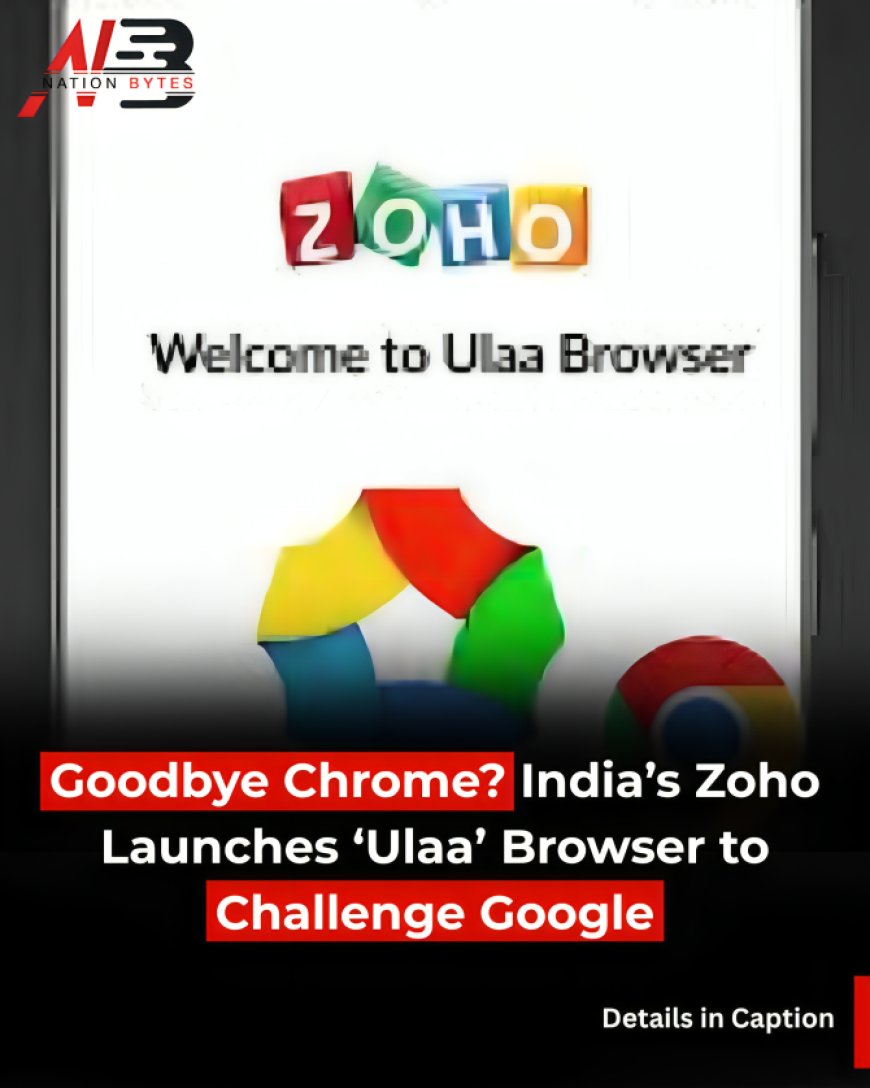Goodbye Chrome? India’s Zoho Launches ‘Ulaa’ Browser to Challenge Google
Indian tech giant Zoho introduces ‘Ulaa,’ a privacy-focused web browser designed to challenge Google Chrome, offering enhanced security, ad-free browsing, and data protection for global users.

In a bold move to take on tech giants like Google, Indian software company Zoho Corporation has launched its very own web browser, Ulaa. The browser, which places a strong emphasis on privacy, security, and user data protection, is being marketed as a direct alternative to Google Chrome, the world’s most widely used browser.
Why Zoho Built Ulaa
Zoho Corporation, founded in 1996 by Sridhar Vembu, is best known for its suite of enterprise applications used by more than 100 million users worldwide. Over the years, Zoho has built a reputation for data privacy and independence, often positioning itself as a trustworthy alternative to Big Tech.
According to company officials, the primary motivation behind Ulaa’s development was the growing concern over how mainstream browsers like Chrome, Edge, and Safari collect and monetize user data. Ulaa aims to create a browsing experience that is secure, ad-free, and free from surveillance capitalism.
“We believe users should not have to trade their privacy for convenience. Ulaa is built with the principle of putting users in control of their browsing experience,” a Zoho spokesperson said at the launch event.
Features of Ulaa Browser
The Ulaa browser comes packed with features designed to attract users away from Google Chrome and other established browsers. Some of the standout offerings include:
Privacy by Default
Unlike Chrome, Ulaa does not track users’ online activity. It automatically blocks third-party trackers, ads, and data mining tools that compromise user privacy.
No Ads, No Profiling
Zoho has committed that Ulaa will not display targeted ads or build user profiles based on browsing history — a direct contrast to Google’s ad-driven business model.
Enhanced Security Modes
Ulaa provides multiple browsing modes, including Work Mode, Personal Mode, and Kids Mode, each tailored with different levels of security and restrictions. Kids Mode, for instance, restricts inappropriate content and ensures safe browsing for children.
Built-in Productivity Tools
The browser integrates with Zoho’s ecosystem, offering access to its apps like Zoho Mail, Zoho Writer, and Zoho Projects, making it especially attractive to businesses and enterprise users.
Cross-Device Syncing
Through an encrypted Zoho account, Ulaa allows users to sync browsing data securely across devices without exposing it to third-party servers.
Faster Performance
Zoho claims that Ulaa is optimized for speed, consuming less memory compared to Chrome, which is notorious for its high RAM usage.
India’s Answer to Google Chrome
Google Chrome currently dominates the browser market with more than 60% global share. Competing against such a giant is no small feat. However, Zoho believes that the global demand for privacy-first alternatives creates a window of opportunity.
India, with its rapidly expanding internet user base of over 800 million people, is a natural launchpad for Ulaa. By focusing on local innovation and a trust-based model, Zoho hopes to capture a meaningful share of both domestic and international markets.
Global Implications of Ulaa
While Ulaa’s immediate impact will be felt in India, Zoho’s ambitions extend far beyond. The browser is being made available globally from the start, targeting privacy-conscious users in Europe, North America, and Asia.
Experts believe Zoho’s biggest advantage lies in its enterprise customer base. Since millions of businesses already use Zoho applications, Ulaa could naturally integrate into workplace environments, providing a secure and ad-free browsing option.
Challenges Ahead
Despite its strong features and privacy-first pitch, Ulaa faces significant challenges:
-
Market Domination by Google Chrome: Convincing users to switch from Chrome, which is deeply embedded in Google’s ecosystem (Gmail, Drive, YouTube), will be difficult.
-
Competition from Other Privacy Browsers: Browsers like Brave, DuckDuckGo, and Mozilla Firefox already cater to privacy-conscious users, meaning Ulaa will need a clear differentiator.
-
User Habits and Ecosystem Lock-In: Many users are tied into existing browsers through passwords, extensions, and synced accounts, creating a barrier to switching.
However, Zoho’s reputation as an independent, debt-free, and privacy-focused company gives Ulaa a credibility advantage that could attract users frustrated with Big Tech.
Since its launch, Ulaa has generated significant buzz in the Indian tech community. Privacy advocates have welcomed the move, praising Zoho for challenging Google’s dominance. Social media discussions have highlighted curiosity about whether Ulaa can truly replace Chrome for everyday users.
The launch of Zoho’s Ulaa browser is a landmark moment for India’s tech industry. By taking on Google Chrome, Zoho is not only challenging the world’s biggest browser but also making a bold statement about digital independence and privacy-first innovation.

 Israr Ahmed
Israr Ahmed